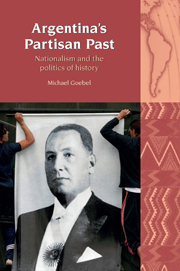Book contents
- Frontmatter
- Contents
- Acknowledgements
- List of acronyms and abbreviations
- Introduction
- 1 Argentina's two pantheons: from mitrismo to revisionism
- 2 Between co-optation and opposition: Peronism, nationalism and the politics of history, 1943–55
- 3 The deepening polarisation: the proscription of Peronism and its politics of history, 1955–66
- 4 The apogee of revisionism: nationalism, political violence and the politics of history, 1966–76
- 5 New narratives for a new era? Shifts, decline and resurgence of nationalist constructions of the past since 1976
- Conclusion
- Glossary
- Bibliography
- Index
Introduction
- Frontmatter
- Contents
- Acknowledgements
- List of acronyms and abbreviations
- Introduction
- 1 Argentina's two pantheons: from mitrismo to revisionism
- 2 Between co-optation and opposition: Peronism, nationalism and the politics of history, 1943–55
- 3 The deepening polarisation: the proscription of Peronism and its politics of history, 1955–66
- 4 The apogee of revisionism: nationalism, political violence and the politics of history, 1966–76
- 5 New narratives for a new era? Shifts, decline and resurgence of nationalist constructions of the past since 1976
- Conclusion
- Glossary
- Bibliography
- Index
Summary
This book is about the interaction between nationalism and the politics of history in twentieth-century Argentina. The concepts of ‘nationalism’ and ‘politics of history’ are both contested, but the second is perhaps easier to define. Most historians would agree that knowledge, including historical knowledge, is a crucial means in struggles for the achievement of political power. It follows that interpretations of history, whether consciously or not, are often produced, disseminated, appropriated and used for political purposes. By politics of history I mean the ways in which history was written and mobilised in order to affect the distribution of political power in a society. The ideologies in whose name this is done obviously vary, but since historical narratives, myths and symbols are the stuff from which national identities are construed, many politics of history are embedded in debates over what constitute the essential traits of a given nation-state. In other words, not all politics of history are nationalist, but all nationalisms delve into the nation's past as a basis for present political claims. Eric Hobsbawm has put it thus in the following oft-cited and catchy statement:
[H]istorians are to nationalism what poppy-growers in Pakistan are to heroin addicts: we supply the essential raw material for the market. Nations without a past are contradictions in terms. What makes a nation is the past, what justifies one nation against others is the past, and historians are the people who produce it.
- Type
- Chapter
- Information
- Argentina's Partisan PastNationalism and the Politics of History, pp. 1 - 22Publisher: Liverpool University PressPrint publication year: 2011

